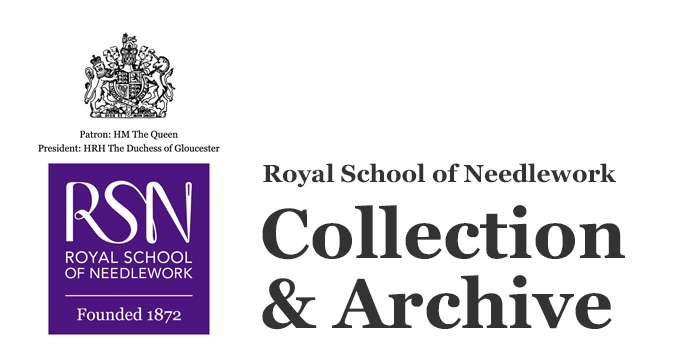Sleeve bands
Object name
Date made
Late 19th century-early 20th century
Place made
Description
Pair of Chinese sleeve bands dating to the 19th or 20th century, with some of the Eight Buddhist Treasures in blue, white, and gold thread.
Content description
Late 19th or early 20th-century Chinese sleeve bands featuring some of the Eight Buddhist Treasures worked in dark and light blue and white silk and gold passing threads on a white silk satin ground. The Buddhist symbols on these sleeves are the wheel, treasure vase, endless knot, and lotus. Other motifs like butterflies and various flowers are also included.
The sleeves, which are symmetrical, have been embroidered in satin stitch, long and short stitch, couching, Chinese knots, and the occasional straight stitch on the edges of the butterflies' wings. Chinese knots are used exclusively for the wheel, peony, and treasure vase. Gold passing threads have been couched down around the edges of the primary motifs.
Embroidered sleeve bands such as the ones seen here were made to be sewn onto the sleeves of Chinese women's robes during the Qing Dynasty (1644-1911). These items of haberdashery often include standalone motifs like birds or flowers, idealised landscapes, or depictions of popular Chinese tales. These sleeve bands date to the end of the Qing Dynasty, placing them at the end of the 19th century or beginning of the 20th.
The sleeves, which are symmetrical, have been embroidered in satin stitch, long and short stitch, couching, Chinese knots, and the occasional straight stitch on the edges of the butterflies' wings. Chinese knots are used exclusively for the wheel, peony, and treasure vase. Gold passing threads have been couched down around the edges of the primary motifs.
Embroidered sleeve bands such as the ones seen here were made to be sewn onto the sleeves of Chinese women's robes during the Qing Dynasty (1644-1911). These items of haberdashery often include standalone motifs like birds or flowers, idealised landscapes, or depictions of popular Chinese tales. These sleeve bands date to the end of the Qing Dynasty, placing them at the end of the 19th century or beginning of the 20th.
Dimensions
width: 31cm
height: 62cm
height: 62cm
Materials
Stitches
Techniques
Motifs
Credit line
Gift of Jean Panter, 2009.
Catalogue number
RSN.1459
© Royal School of Needlework

